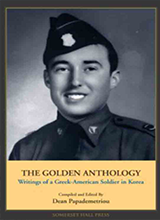SOMERSET HALL PRESS ANNOUNCES PUBLICATION OF BOOK OF WRITINGS OF A GREEK-AMERICAN SOLDIER IN KOREA
BOSTON – A new book describes the experiences, in his own words, of John C. Papademetriou, a Greek-American immigrant and a U.S. soldier who was killed while serving bravely in Korea. The book is entitled, The Golden Anthology: Writings of John C. Papademetriou, a Greek-American Soldier in Korea (1947-1951).
The Golden Anthology offers an illuminating glimpse into a pivotal but little known time in American history – before and during the Korean War – as seen through the eyes of John C. Papademetriou, a Greek-American immigrant who enlisted in the United States Army in 1950, just as military operations commenced in Korea.
It is an idealistic story of a young man who served his new country and gave the ultimate sacrifice of his life, in 1951.
John was born in Greece in 1929, and spent the early years of his life there. In 1941, during World War II, when he was only 12 years old, John was captured and imprisoned in a forced labor camp.
Although he was the youngest boy in the camp, he was treated as harshly as the older men were. He later wrote that the food was “not fit for the chickens.” He was finally released from the camp after the Red Cross petitioned on his behalf.
After World War II, John immigrated to the United States in 1947, and was reunited with his father, Rev. Constantine G. Papademetriou.
Rev. Constantine had come to the United States alone in 1939 to serve as a Greek Orthodox priest, expecting to bring his family to join him when he was settled.
Unfortunately, World War II kept the family separated for 8 years. Eventually, John’s family came to Moline, Illinois. John marveled at the buildings and clean streets, and he eagerly embraced life in post-War America.
After graduating from high school, John enlisted in the U.S. Army in 1950. This was the time that hostilities were escalating in Korea. Despite the danger, John joined the medical corps, feeling that it was his patriotic duty. He was highly respected among his fellow soldiers in Korea, and was referred to admiringly as “Doc the Greek.”
John served in the 9th Regiment of the Second Division, which went through some of the toughest fighting in the Korean War and sustained the most casualties.
As Col. Sherman Pratt (ret.), who served as Rifle Company Commander of the 23rd Infantry Regiment in the 2nd Infantry Division of the United States Army in Korea, said, “John Papademetriou went through some of the toughest fighting in the whole Korean War.
The 2nd Division holds the record by far of the most casualties and MIAs in the War. The 9th Regiment was almost wiped out in a rear guard action that enabled the bulk of the 8th Army to withdraw to more secure positions. John was right in the middle of this devastating slaughter.” John was killed in 1951 during the “May Massacre” in Central Korea, while tending to a fellow wounded soldier during combat.
He posthumously received the high honors of the Silver Star and the Purple Heart, and was buried with full honors at Arlington National Cemetery, outside Washington, D.C.
After immigrating to the United States, John quickly learned English and became a prolific writer of poems and essays in English and Greek. He wrote about his life in Greece, in the United States, and in the Army. He also wrote about patriotism, philosophy, and love.
Now, over 50 years after his death, John’s writings – including poems, essays, letters home, and a brief autobiography – are collected in a single volume with pictures and other materials. It is a testament to an idealistic young man and his era.
John’s writings were compiled and edited by his nephew, Dean Papademetriou, an attorney, writer, editor, and businessperson in Boston, Massachusetts. Dean Papademetriou became fascinated by his uncle’s unpublished writings, and realized their importance in telling a wider audience about a patriotic time that is again coming into public view.
Regarding John and The Golden Anthology, Congressman and veteran Mike Bilirakis wrote, “I remember John and the Papademetriou family most fondly fifty-some years ago … As we think of John, we must wonder what contributions to our world he would have made had he not died while serving our Republic. He was a true hero who died while trying to rescue a fellow wounded soldier. He shall live on through his writings.”

